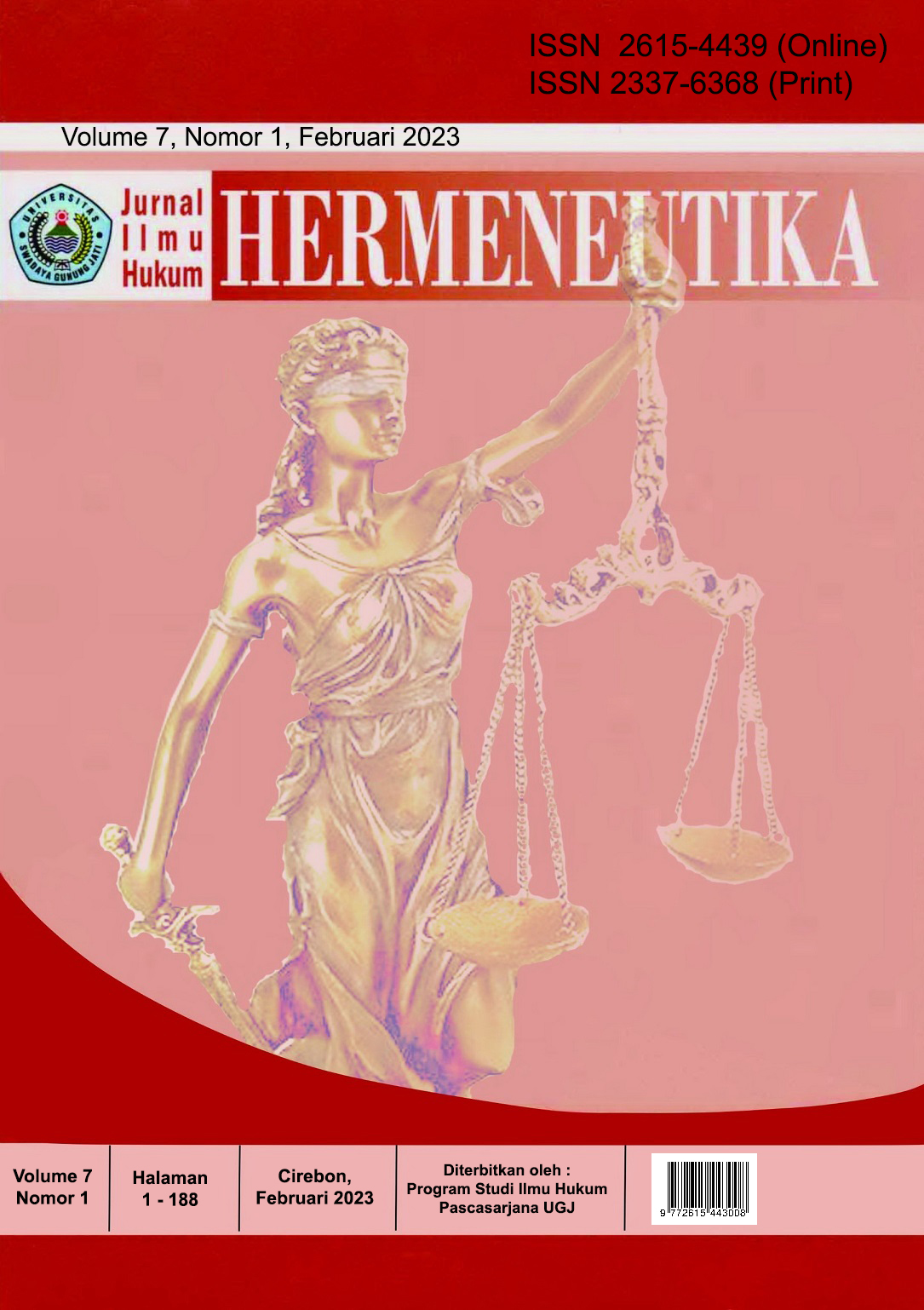ANALYSIS OF THE CRIMINAL SYSTEM OF THE PRACTICE OF PERSECUTION IN THE CRIMINAL OF THEFT IN THE JURISDICTION OF THE ASMAT RESORT POLICE
DOI:
https://doi.org/10.33603/hermeneutika.v6i3.8330Abstract
This study aims to determine the punishment system for perpetrators of persecution of perpetrators of criminal acts of theft in the Legal Area of the Asmat Resort Police and to determine the obstacles to law enforcement against perpetrators of practicing persecution of perpetrators of criminal acts of theft in the Legal Area of the Asmat Resort Police. The author analyzes the data using the socio-juridical approach method, that is, in addition to studying law theoretically and normatively in the form of analyzing various laws and regulations, books and articles that have a correlation and are relevant to the problems studied, will also examine the law in its implementation using techniques data collection through interviews and documentation. The criminal system and punishment that can be applied to perpetrators of persecution of perpetrators of criminal acts of theft is only limited to perpetrators of persecution who actually act as movers and provocateurs who influence the practice of persecution for members of the public at the place where the perpetrators of theft were caught, by imposing Article 170 Paragraph (3) and Article 351 of the Criminal Code, if the persecution is carried out until the perpetrator of the theft dies, while other residents who carry out the persecution are not harmed. The obstacles to law enforcement for the perpetrators of the persecution of the perpetrators of the crime of theft include the lack of Investigation Unit personnel and members of the Asmat Police, the absence of operational car facilities that can carry the perpetrators of persecution because there are no cars that can operate in the Asmat Regency area, the lack of members' legal knowledge, and the absence of a district attorney's office or a district court in Asmat District, which made it difficult for the perpetrators of persecution to be detained.References
Buku:
Abdul Latif, Fungsi Mahkamah Konstitusi, Yogyakarta: Kreasi Total Media 2009.
Barda Nawawi Arief, Bunga Rampai Kebijakan Hukum Pidana, Bandung: Citra Aditia Bakti, 1996.
Derita Prapti Rahayu, Metode Penelitian Hukum, Yogyakarta: Thafa Media. 2020.
Ekasaputra, Muhammad, dan Abul Khadir, Sistem Pidana di Dalam KUHP dan Pengaturannya Menurut Konsep KUHP Baru, Medan: USU Press, 2010.
Golkar Pangarso R.W, Penegakkan Hukum Perlindungan Ciptaan Sinematografi, Bandung: PT. Alumni, 2015.
Karen Lebacqz, Teori-Teori Keadilan, Bandung: Nusa Media, 1986.
M.Yahya Harahap, Pembahasan Permasalahan dan Penerapan KUHAP Penyidikan dan Penuntutan, Jakarta: Sinar Grafika, 2007.
Muladi, Proyeksi Hukum Pidana Materiil Indonesia, Semarang: Univ. Diponegoro, 1997.
Nasifah, Tindak Pidana Persekusi Dalam Perspektif Hukum Islam, Jakarta: Skripsi Fakultas Syariah Dan Hukum, Universitas Islam Negeri Syarif Hidayatullah, 2018.
Roni Rahman Nitibaskara, Tegakkan Hukum Gunakan Hukum, Jakarta: Kompas Media Nusantara, 2007, cet. 2.
Winarno, Paradigma Baru Pendidikan Kewarganegaraan, Jakarta: PT. Bumi Aksara 2019.
Yadin, Abdul Razak, Aswanto, Problematika Penegakan Hukum di Indonesia Menuju Hukum Yang Responsif Berlandaskan Nilai-Nilai Pancasila, Fakultas Hukum, Unhas, 1999.
Artikel:
Diakses di http://poskotanews.com/2017/06/04/dpr-nilai-persekusi-bukan-istilah-hukum-kuhp/tanggal 18 Juli 2022, Jam 12.14 WIT.
Diakses di http://www.hukumonline.com/berita/baca/persekusi-bukan-solusi-dahulukan-mediasi-dan-litigasi-oleh-reda-manthovani, tanggal 19 Juli 2022, Jam 13.34 WIT
Jurnal:
Bahder Johan Nasution, Kajian Filosofis Tentang Konsep Keadilan Dari Pemikiran Klasik Sampai Pemikiran Modern, Yustisia Vol. 3 No.2 Mei - Agustus 2014.
Candra, Septa, Pembaharuan Hukum Pidana; Konsep Pertanggungjawaban Pidana dalam Hukum Pidana Nasional yang akan Datang, Jurnal Cita Hukum. Vol. 1 No. 1 2013.
Peraturan Perundaang-Undangan:
Kitab Undang-Undang Hukum Pidana (KUHP)
Kitab Undang-Undang Hukum Acara Pidana (KUHAP)
Downloads
Published
Issue
Section
License
The Authors submitting a manuscript do so on the understanding that if accepted for publication, copyright of the article shall be assigned to Jurnal HERMENUTIKA, Sekolah Pascasarjana Ilmu Hukum. Universitas Swadaya Gunung Jati as publisher of the journal. Copyright encompasses rights to reproduce and deliver the article in all form and media, including reprints, photographs, microfilms, and any other similar reproductions, as well as translations.
Jurnal HERMENEUTIKA, Universitas Swadaya Gunung Jati and the Editors make every effort to ensure that no wrong or misleading data, opinions or statements be published in the journal. In any way, the contents of the articles and advertisements published in Jurnal HERMENEUTIKA are the sole responsibility of their respective authors and advertisers.










